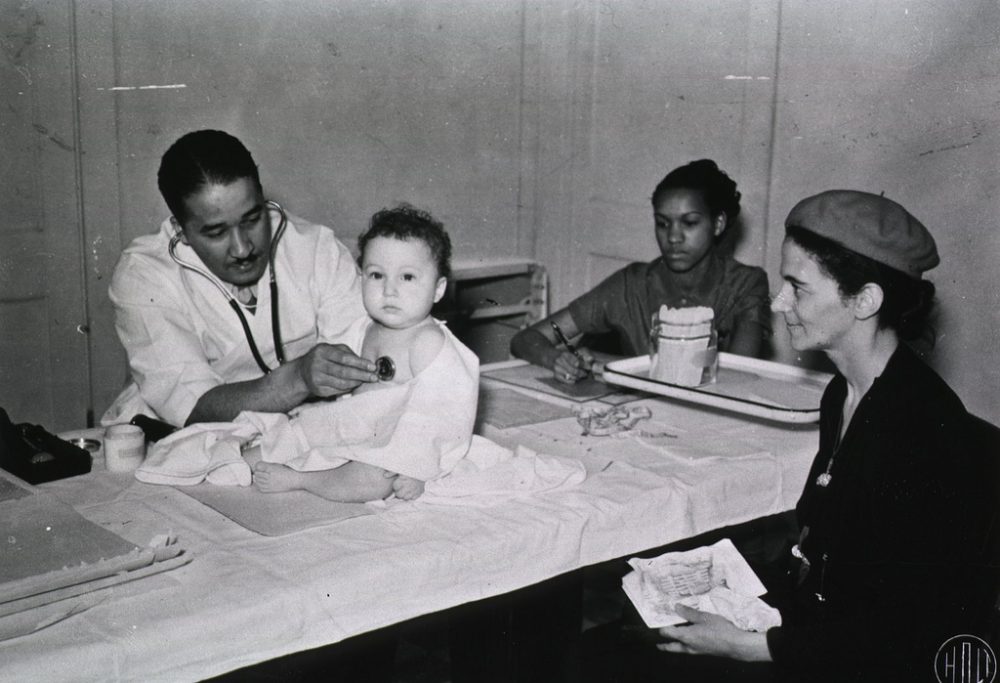Advertisement
Are We Losing Touch In The Doctor-Patient Relationship?
Resume
We all know the ritual when we go to the doctor for a yearly physical: the little light the doctor shines in your ear. The doctor telling you to open your mouth and say, "Ahhh." The doctor asking you to take a deep breath while listening to your lungs.
But as medical technology becomes more sophisticated at making diagnoses, as pressures mount on doctors to see more and more patients and as electronic records — in some ways — reduce patients to the sum of their data, what happens to human touch?
WBUR's Sacha Pfeiffer speaks with two Boston doctors about the decline of the physical exam and the role of physical touch between doctor and patient in the digital age.
Guests
Suzanne Koven, physician at Massachusetts General Hospital and columnist for The Boston Globe. She tweets @SuzanneKovenMD.
Carol Bates, physician at Beth Israel Deaconess and associate professor of medicine at Harvard Medical School.
Highlights
On feeling "melancholy" about losing human touch in the physical exam:
Suzanne Koven: "I certainly don't particularly like performing pelvic exams. Certainly, as a woman, I don't particularly like getting pelvic exams, and I'm very respectful of the evidence-based medicine that the American College of Physicians was looking at — 60 years-plus worth of data — when they made the new recommendation. But it seemed to me just yet another — not to be too melodramatic — a death knell in this sort of intimacy between doctors and patients. So much of our time in the exam room is now spent looking at the computer without eye contact, we're outsourcing things like taking blood pressures to our medical assistants. And we don't want to be too nostalgic for an earlier time when evidence tells us that the earlier time — the things we were doing in that earlier time — weren't effective. But I have a lot of thoughts about what might be lost, even if some of these practices aren't evidence-based medicine."
On the possible benefits of doctors touching patients:
SK: "For one thing, the data — not so much in the pelvic exam — but the data about whether the routine history and physical are useful in making diagnoses are somewhat mixed. But the other piece of it that's more important to me is that patients perceive, in study after study, that if the doctor touches them the doctor cares more for them. I know, in my experience, when I send patients to a specialist, very often if the patient comes back to me unhappy, they'll say, 'I went to this person and they didn't even touch me.' Now, when I read the report I see that the specialist made a good recommendation, did everything completely appropriately. But the patient did not feel well cared for, and to me that counts for a lot."
On the changes to medical training:
Carol Bates: "I don't know that our teaching has changed a tremendous amount... or what residents are currently doing has changed a tremendous amount. That said, there is a focus on technology and our residents are often more focused on the results of a test than on the results of their physical findings and that certainly has changed over the years."
On the impact of electronic medical records:
SK: "As more and more patients have access to read their own medical records, I find that they're coming back and saying, 'That's not what I said. That's not what I felt.' And really feeling that, somehow, that electronic record is, as Dr. [Abraham] Verghese says, is displacing the reality of the patient in the room. And it's a physical reality and that is something that is so essential to what we do, which is why I think there is this — particularly among doctors of a middle-aged generation — a kind of existential angst about, what will we be as professionals when every aspect of the physical exam one day is pared away?"
On situations where a physical exam isn't necessary:
CB: "I think we don't want to over credit the physical exam... It turns out that for a urinary tract infection, for example, we commonly treat people over the telephone. And for sinus infections it turns out that the history is all you need and the physical exam is actually, essentially, useless in making a diagnosis of sinus infections. So there are circumstances where phone treatment absolutely makes sense. The notion of the virtual visit — I would say, getting information that allows us to hone in on what's most important and saving us from asking questions which aren't going to illicit important responses — probably not a valid use of our time. And if we do have a questionnaire completed by a patient that allows us to focus in on what they're talking about, we can use that limited time that we were talking about more wisely."
More
The Boston Globe: Farewell To The Routine Pelvic Exam?
- "Thirty years later, I still remember the day I learned how to perform a pelvic examination. My teacher’s name was Josie. She was a generous soul who, probably for little more than a parking voucher and a coupon for lunch in the hospital cafeteria, agreed to let a dozen gloved pairs of fumbling medical student hands probe her insides."
- "Modern medicine is in danger of losing a powerful, old-fashioned tool: human touch."
This article was originally published on August 18, 2014.
This segment aired on August 18, 2014.
